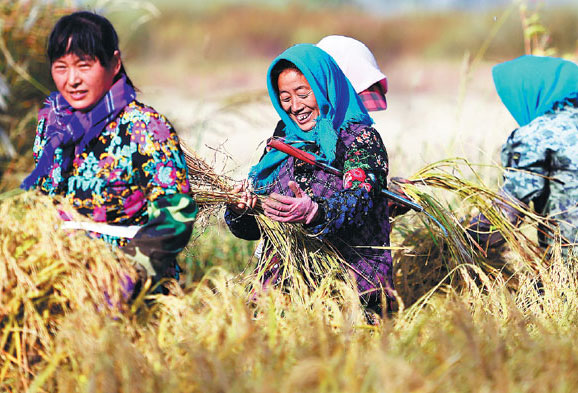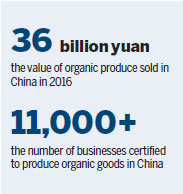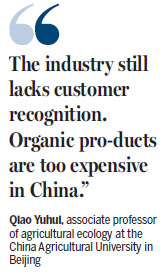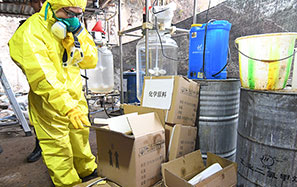'Green' producers look to grow stronger
|
Women harvest organic rice in Wuchang, Heilongjiang province.Wang Jianwei / Xinhua |
Organic foods are becoming increasingly popular in China, but farmers will need government help to ensure the fledgling sector develops efficiently. Wang Xiaodong reports.
For the past four years, Man Fenglin has grown rice organically, despite the rising cost and falling yields.
The crops grown on his 10 hectares of farmland are sold to companies across China for about 21 yuan ($3) a kilogram, more than six times the price of rice grown on farmland treated with synthetic fertilizers, according to Man, from Wuchang county in the northeastern province of Heilongjiang.
"I can still make more money than ever before, even though organic planting requires much more labor and produces fewer crops," he said.
Every year, his organic farmland produces about 550 kg of rice from every 1,000 square meters, compared with harvests of about 750 kg from conventionally farmed land.
Of the 150 or so households in Zhenxing, Man's home village, about 20 are now growing rice organically, he said.
In addition to Heilongjiang, a major area of rice production, organic farming is booming in many other parts of the country, such as the provinces of Sichuan, Guizhou and Zhejiang, according to the Chinese Certification and Accreditation Administration.
Last year, 1.74 billion packages of organic produce, valued at a combined 36 billion yuan, were sold nationwide, a rise of 16 percent from 2015, according to the administration.
The main products include cereals, beans, vegetables, fruits, poultry, aquatic produce and processed goods, such as edible oils, wine, dairy products and textiles.
"With rising awareness of health, the environment and food safety among Chinese consumers, the nation's organic industry has seen rapid development, both in terms of output and sales," the administration said.
The number of businesses certified to produce organic goods has surpassed 11,000, and 1.52 million hectares of farmland are used for organic production, accounting for about 1 percent of the national total.
Huge potential
"I think the organic industry has huge potential in China," said Zhang Youting, deputy CEO of Organic and Beyond, a Beijing company that supplies organic foods.
"As Chinese people become wealthier, they are also becoming more concerned about food safety. The government's resolve to improve food safety in the next few years will make China's organic industry more credible."
Last year, the company's sales rose to about 100 million yuan, a far cry from the 700,000 yuan recorded in 2007 when it started selling organic food such as fruits, vegetables and wine, including imported goods and those grown on certified domestic organic farms, he said.
China's standards for organic certification are in line with international standards and are among the "strictest in the world", according to the Certification and Accreditation Administration.
As in other countries, organic production in China follows the principle of not using synthetic pesticides, fertilizers or genetic-modification technologies.
Organic products must be sold in packages, and each one must be labeled with an electronic code that allows buyers to track down information about the product, such as its certification status, and learn about the company that produced it.
Businesses whose certification is revoked because they have used banned materials, such as synthetic fertilizers, cannot reapply for five years after the offense, and all farmland must have been "green" for at least two years before it becomes eligible for certification.
Wang Hongfeng has spent the last two years converting part of his 4-hectare farm in Nannie, a village in the Beijing suburbs, for organic use. He expects to complete the process by August, after which he will apply for a certificate to produce organic foods.























